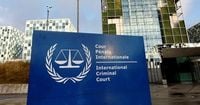Former Philippine President Rodrigo Duterte’s legal battle at the International Criminal Court (ICC) is gathering momentum, with a growing number of victims seeking to participate in the case against him. The ICC, based in The Hague, Netherlands, has recently seen its registry transmit more applications from individuals claiming harm during Duterte’s controversial war on drugs, a campaign that has drawn global scrutiny and polarized opinion in the Philippines and beyond.
On August 27, 2025, the ICC Registry delivered a fresh batch of victim applications to Pre-Trial Chamber I, according to documents posted on the ICC’s official website and reported by GMA Integrated News and Philippine Daily Inquirer. These applications, reviewed by the court’s Victims Participation and Reparations Section, reflect the growing engagement of those affected by the anti-drug campaign, which spanned Duterte’s time as both mayor of Davao City and president of the Philippines.
To date, the ICC has logged a total of 322 victim applications in the case filed against Duterte. Among these, 18 applicants have stated that they are seeking only reparations, and as such, were registered but not considered at the current stage of proceedings, as outlined in an August 27 document titled “Registry Report on Group A and B Applications for Victim Participation in Pre-Trial Proceedings.” The remaining 304 applications are being processed, with 35 already submitted to Pre-Trial Chamber I under three distinct groups: 15 under Group A, 10 under Group B, and 10 under Group C (the latter submitted on August 20, 2025).
These victims are not limited to those directly killed or injured in the drug war. The ICC recognizes indirect victims as well—family members or relatives who suffered psychological harm as a result of losing loved ones or being swept up in the violence. This broad definition ensures that the human cost of the campaign is fully acknowledged, even if the details of each application remain confidential at this stage, with registry annexes classified as confidential ex parte (without notice to the defense).
Duterte’s legal team and ICC prosecutors have, at the court’s instruction, agreed on several basic facts about the case. According to a document titled “Joint Prosecution and Defence Submission on Agreed Facts,” both parties concurred on Duterte’s birth date (March 28, 1945), birthplace (Maasin, Southern Leyte), nationality, and the definition of a barangay—the smallest unit of government in the Philippines. The initials “PRRD,” commonly used to refer to Duterte, were also acknowledged. However, only four out of the ten facts proposed by the prosecution were jointly accepted, underscoring the contested nature of the proceedings.
The timeline of the case is also notable. The period under scrutiny begins in November 2011, when Duterte was still mayor of Davao City, and extends to March 2019, the date when the Philippines’ withdrawal from the Rome Statute (the treaty establishing the ICC) took effect. This withdrawal, ordered by Duterte himself, has not shielded him from prosecution for alleged crimes committed while the Philippines was still a member state.
Duterte’s arrest on March 11, 2025, by Philippine authorities and subsequent transfer to The Hague marked a dramatic turn in the saga. Two days later, on March 14, he appeared before the ICC via video link for his pretrial, where the charges were read and his rights under the Rome Statute explained. He is currently detained at the Scheveningen Prison complex, a facility known for holding high-profile international defendants.
The confirmation of charges hearing is set for September 23, 2025, a date that looms large for both Duterte’s supporters and detractors. The outcome of this hearing will determine whether the case proceeds to a full trial, with potentially far-reaching implications for international justice and the Philippines’ political landscape.
The scale of the alleged abuses during Duterte’s drug war is staggering. Official government figures put the death toll at a minimum of 6,000 from 2016 to 2019, but human rights organizations and the ICC prosecutor estimate the number could be anywhere from 12,000 to 30,000. This wide disparity in figures is emblematic of the deep divisions over the campaign, which Duterte and his allies have defended as a necessary response to rampant drug crime, while critics have denounced it as a campaign of extrajudicial killings and human rights violations.
According to Atty. Joel Butuyan, an ICC-accredited lawyer cited by GMA Integrated News, victims can continue to apply for participation in the proceedings even as the trial moves forward. This means the pool of recognized victims may grow, reflecting the ongoing impact of the drug war on Philippine society.
The ICC’s handling of the case is being closely watched, not just in the Philippines but internationally. The court’s jurisdiction covers crimes against humanity, war crimes, and genocide committed on the territory of member countries or by their nationals. However, the ICC’s authority is contested by some states, including the United States, China, Russia, and Israel, which argue that their nationals are not subject to the court’s reach. The Philippines’ own withdrawal from the Rome Statute in 2019 was partly motivated by Duterte’s objections to the ICC’s investigation into his administration’s policies.
Yet, as the recent transmission of victim applications shows, the ICC’s processes continue to move forward, undeterred by political obstacles. The court’s willingness to consider indirect victims—such as family members suffering psychological harm—signals a broad and inclusive approach to justice. It also highlights the far-reaching consequences of state policies that, while aimed at tackling crime, can leave deep scars across entire communities.
The broader context for the ICC’s work is also in flux. As Reuters reported, other international cases—such as those involving alleged war crimes in Gaza—have drawn fierce responses from powerful states, including U.S. sanctions against NGOs cooperating with the court. The ICC’s determination to uphold its mandate in the face of such pressures is a testament to its role as a forum for accountability, even when the political winds blow strong in the other direction.
For now, all eyes are on The Hague and the upcoming confirmation of charges hearing. The victims’ voices, now numbering in the hundreds, are set to play an increasingly prominent role in the proceedings. Whether justice will ultimately be served remains to be seen, but the process itself is already reshaping the conversation about accountability, human rights, and the legacy of Rodrigo Duterte’s war on drugs.


